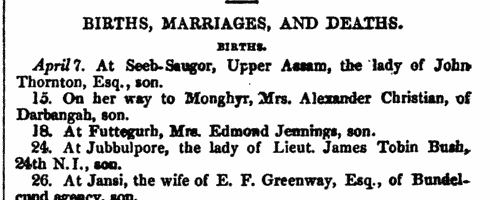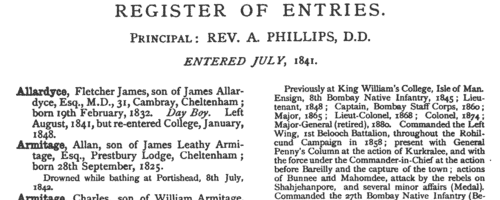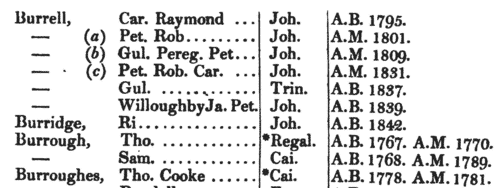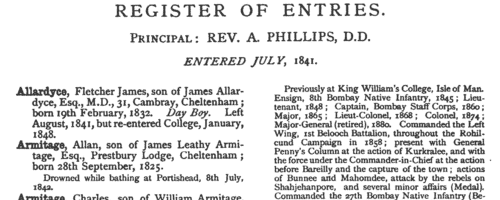Swiney Surname Ancestry ResultsOur indexes 1000-1999 include entries for the spelling 'swiney'. In the period you have requested, we have the following 128 records (displaying 61 to 70): Single Surname Subscription | | | Buying all 128 results of this search individually would cost £698.00. But you can have free access to all 128 records for a year, to view, to save and print, for £100. Save £598.00. More... |
These sample scans are from the original record. You will get scans of the full pages or articles where the surname you searched for has been found. Your web browser may prevent the sample windows from opening; in this case please change your browser settings to allow pop-up windows from this site. County Cork Freeholders: Booth No 6
(1841)
The poll books of voters in the parliamentary election for county Cork 13 to 15 July 1841 delivered in to the select committee that subsequently looked into the propriety of the proceedings, and then annotated with observations as to those votes to which objection had been raised. There are separate books for seven booths, with the electors' names in order of voting: giving each freeholder's full name, place of abode, situation of the freehold, value, number and date in the alphabetical registry book, and for which candidates they voted (Daniel O'Connell, Edmund Burke Roche, Nicholas Philpot Leader, and Robert Longfield). The seven booths are for these areas: 1. Duhallow barony; 2. Hall County Side, East East Carbery, West East Carbery and East West Carbery; 3. Barrymore and West West Carbery; 4. Condons and Fermoy; 5. Imokelly and West Muskerry.SWINEY. Cost: £6.00.  | Sample scan, click to enlarge

| Dissolutions of Partnerships
(1841)
Trade partnerships dissolved, or the removal of one partner from a partnership of several traders, in England and Wales
SWINEY. Cost: £6.00.  | Sample scan, click to enlarge

| Irish Bankrupts
(1842)
Bankruptcy notices for Ireland: bankruptcy often caused people to restart their lives elsewhere, so these are an important source for lost linksSWINEY. Cost: £6.00.  | Sample scan, click to enlarge

| Calcutta Bridegrooms
(1843)
The Indian Mail, 'A Monthly Register for British & Foreign India, China, & Australasia' commenced publication 9 May 1843 as a continuation of the digest of Eastern intelligence that thitherto had formed a part of the Asiatic Journal. The Register section contained notices of births, marriages and deaths from the presidencies of Calcutta (extending across northern India, and into Burma), Madras, and Bombay (including Aden), as well as Australasia, Ceylon, China, Cape of Good Hope, Mauritius, and Singapore.
SWINEY. Cost: £6.00.  | Sample scan, click to enlarge

| Irish Bankrupts
(1843)
Bankruptcy notices for Ireland: bankruptcy often caused people to restart their lives elsewhere, so these are an important source for lost linksSWINEY. Cost: £6.00.  | Sample scan, click to enlarge

| Irish Insolvents
(1844)
Insolvency notices for Ireland: insolvency often caused people to restart their lives elsewhere, so these are an important source for lost links, especially for emigrantsSWINEY. Cost: £6.00.  | Sample scan, click to enlarge

| Boys entering Cheltenham College
(1845)
Cheltenham College 'was founded in order to provide for the sons of gentlemen a Classical, Mathematical, and General Education of the highest order, on moderate terms, in strict conformity with the principles and doctrines of the Church of England.'
Andrew Alexander Hunter, the college registrar, compiled the first edition of the College Register in four parts from 1883 to 1886: these merely listed the boys by term of entry, with their dates of birth and names and addresses of their fathers. Circulars were also sent out to all Old Cheltonians whose addresses were known, requesting additional details. On the basis of the returns from these and Hunter's further researches, this much fuller register was published in 1890.
The information after each boy's name is given (where known and applicable) in this format: father's full name and address as of the time the boy entered the college; class and department on entering the college (classes being number from 1 downwards, and these again divided into A and B, some into C and D, others into P (Principal's side) and V. P. (Vice-Principal's side) - 1A was the highest class in each department: besides this, certain others were called Addiscombe, Woolwich, Civil, Direct, Line, Sandhurst, Naval, Special, Preparatory, Latin, and India Civil) and the same on leaving, name of Boarding House (or 'Day Boy'), scholastic and athletic honours attained at the college, and subsequent career (including date and place of death, or present address in 1890, if known).SWINEY. Cost: £4.00.  | Sample scan, click to enlarge

| Insolvents in Ireland
(1845)
Perry's Bankrupt and Insolvent Gazette, issued monthly, included lists of insolvencies and stages in the process whereby the insolvents petitioned for release from debtors' prison. The insolvent is generally referred to by name (surname first), address and trade. This is the index to the names of Irish insolvents, from the issues from January to December 1845.SWINEY. Cost: £6.00.  | Sample scan, click to enlarge

| Graduates of Cambridge University
(1760-1846)
Joseph Romilly, registrar of the university of Cambridge, compiled Graduati Cantabrigienses, a catalogue of graduates from the academic year of admissions 1760 through to 10 October 1846. The names are arranged alphabetically by surname, and then chronologically by christian name: the college is given, with an asterisk in those cases where the man became a fellow, and then, in chronological order, his degrees. SWINEY. Cost: £4.00.  | Sample scan, click to enlarge

| Boys entering Cheltenham College
(1846)
Cheltenham College 'was founded in order to provide for the sons of gentlemen a Classical, Mathematical, and General Education of the highest order, on moderate terms, in strict conformity with the principles and doctrines of the Church of England.'
Andrew Alexander Hunter, the college registrar, compiled the first edition of the College Register in four parts from 1883 to 1886: these merely listed the boys by term of entry, with their dates of birth and names and addresses of their fathers. Circulars were also sent out to all Old Cheltonians whose addresses were known, requesting additional details. On the basis of the returns from these and Hunter's further researches, this much fuller register was published in 1890.
The information after each boy's name is given (where known and applicable) in this format: father's full name and address as of the time the boy entered the college; class and department on entering the college (classes being number from 1 downwards, and these again divided into A and B, some into C and D, others into P (Principal's side) and V. P. (Vice-Principal's side) - 1A was the highest class in each department: besides this, certain others were called Addiscombe, Woolwich, Civil, Direct, Line, Sandhurst, Naval, Special, Preparatory, Latin, and India Civil) and the same on leaving, name of Boarding House (or 'Day Boy'), scholastic and athletic honours attained at the college, and subsequent career (including date and place of death, or present address in 1890, if known).SWINEY. Cost: £4.00.  | Sample scan, click to enlarge

|
Research your ancestry, family history, genealogy and one-name study by direct access to original records and archives indexed by surname.
|












